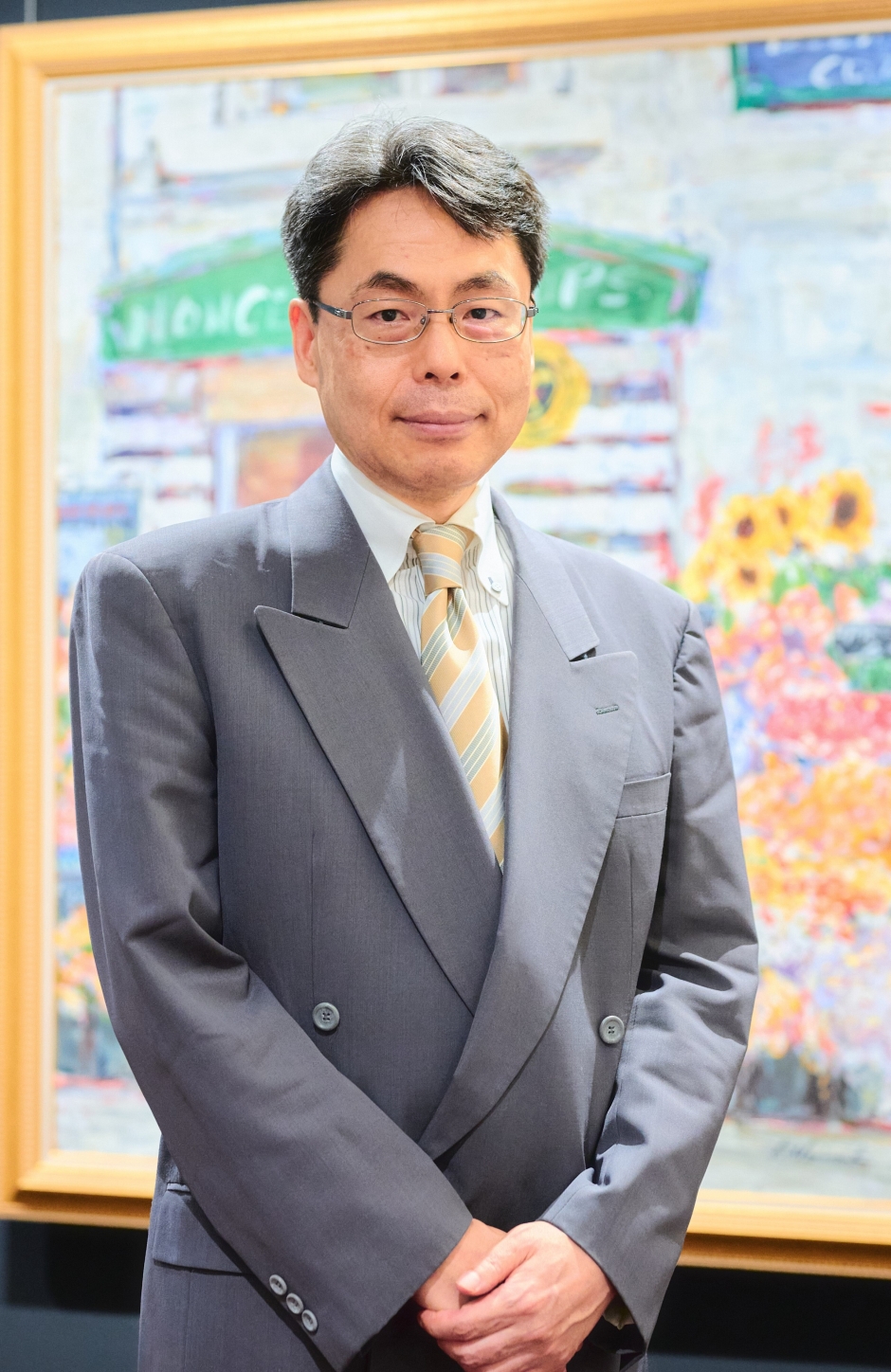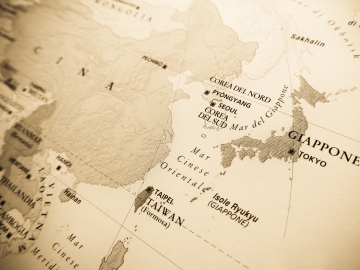Pioneering the future of sustainable technology and society through “responsible research”
Who will resolve disputes that arise in virtual space, and by what rules? Who will be held responsible for damages caused by negligence in self-driving cars, and how? While new services based on cutting-edge technology make society more convenient, they also give rise to unprecedented, difficult problems. Interdisciplinary research is underway to tackle these issues from the perspectives of ethics and law, and to consider the present by backcasting from a desirable vision of the future.
◆ Addressing legal and ethical issues that arise with the social implementation of science and technology
──As new technologies such as AI (artificial intelligence) and the metaverse spread into society, issues such as copyright and security have also become apparent. Is this also where the concerns of this Institute stem from?
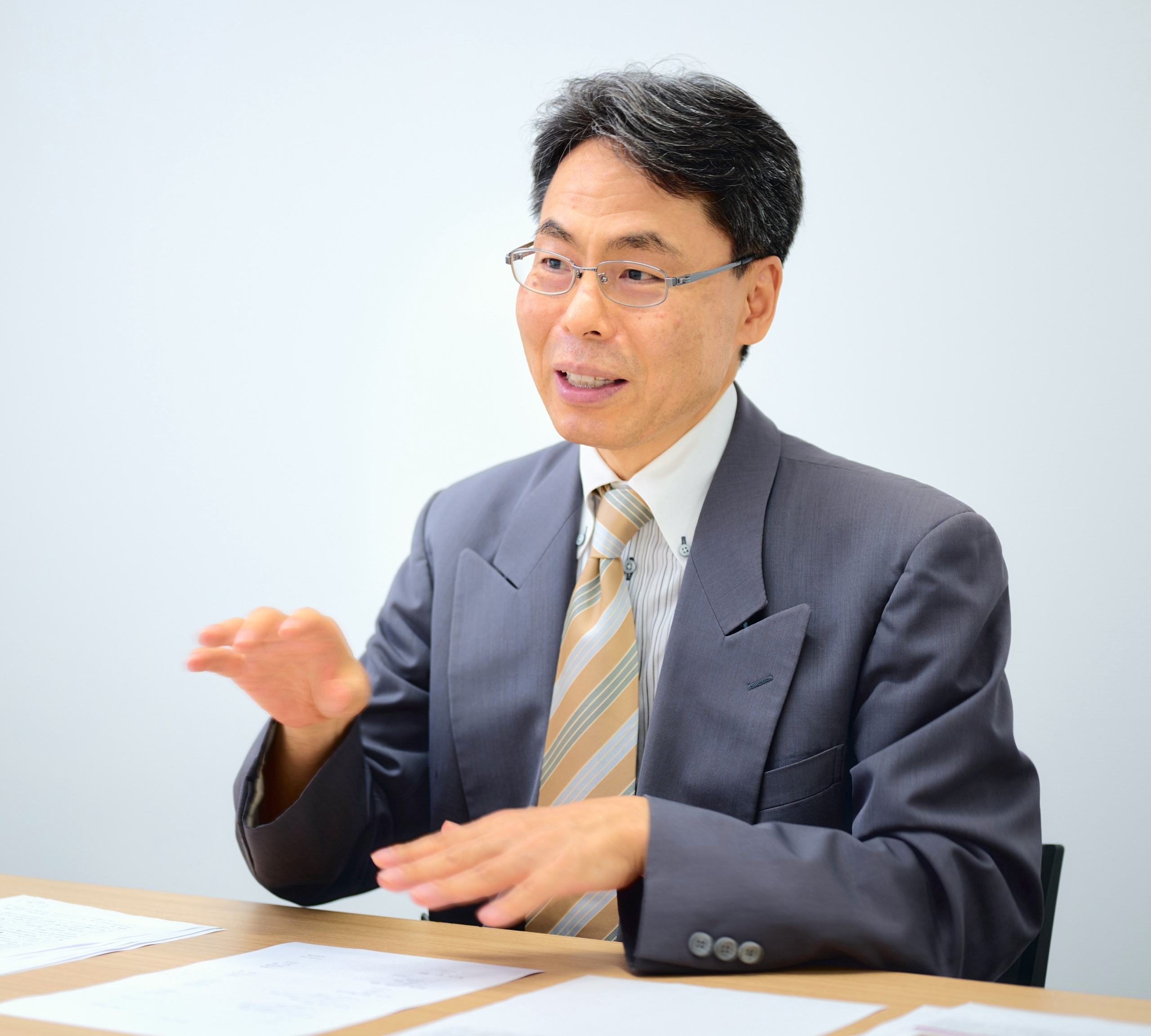
SHIMOYAMA Kenji (Director/Professor, Faculty of Law)
That’s right. The word “sustainability” is getting a lot of attention, as seen in the SDGs, but this is not just something that applies to the natural world, such as the global environment, but is also required for human society. From that perspective, this Institute was established to understand the progress of science and technology and to look at the many legal and ethical issues that arise when it is implemented in society. That was in April 2021.
Laws and legal systems were originally established to deal with problems when they occurred. However, this is too late when it comes to science and technology. For example, as soon as the Internet became known to the general public in the early 1990s, it spread rapidly throughout society. However, because it was introduced before proper rules were established, problems such as the leakage of personal information and unauthorized access became apparent later on and have become major social issues that continue to this day.
Therefore, if it is assumed that the technology being developed now will be applied to society in the future, it would be better to make sure that the entire nation understands in advance how it will be useful in society, and then tailor the technology to suit that use. Alternatively, when it is introduced to society, we should make preparations to prevent as many problems as possible, and if they do occur, to be able to solve them immediately. This means researching the ideas and mechanisms for doing so.
──What specific issues are the subject of your research?
As these issues relate to the structure of our lives and society, the list is endless, but at this Institute we have decided to focus on three areas that are considered particularly important when considering the next generation of social systems: the metaverse, remote medical care, and autonomous driving/MaaS.
The metaverse is a virtual space created on the Internet where anyone can freely interact and receive services by dressing up as a character called an avatar. At first glance, this may seem convenient, but for example, when avatars buy and sell goods in a virtual shop, there are actually no legal rules yet to crack down on fraudulent transactions or protect consumer rights. Problems such as goods not being delivered, not being paid, and illegal goods being sold are quite conceivable, so just because there are no laws that can be applied to the virtual space, we cannot leave it as a lawless zone.
First of all, are avatars people or things? Currently, they are treated as things, just like pets, so if a conflict occurs between avatars involving defamation or human rights violations, as things stand, there is no way to sue them. So, if they are to be considered people, how should the current law be changed? What should be done if the issue cannot be resolved domestically, for example, because the server is located in a foreign country? This issue is likely to extend to treaties between nations. Since it is an event that takes place in a virtual space, it may even be difficult to prove that you have been harmed. We need to uncover these issues one by one.
◆ Identifying issues through a multi-layered approach from a variety of fields
──You say that you approach issues from a multifaceted perspective, incorporating ethical, public law, and private law. What does that mean?
There are various issues, but not all of them require legal regulation. Some issues can be resolved without legal regulation through voluntary control by society, and in such cases, an ethical or moral perspective is required. Therefore, it is appropriate to start from here.
It may be easier to understand if you think about problems in life science. For example, is it acceptable to create a new organism by crossing the genes of two animals, A and B? First, consider the ethical aspect. If the public has an ethical view that it is permissible, then a legal framework must be created that defines to what extent it is permissible and what is not. This legal framework has two aspects: public law, which is administrative regulation including criminal penalties, and private law such as civil law, which seeks to reconcile the interests of the parties involved through contracts and compensation. By considering the combination of these, a system must be put in place to allow each role to function well.
──To look at a single issue in a complex and multi-layered way, you need to look at it from many different perspectives.
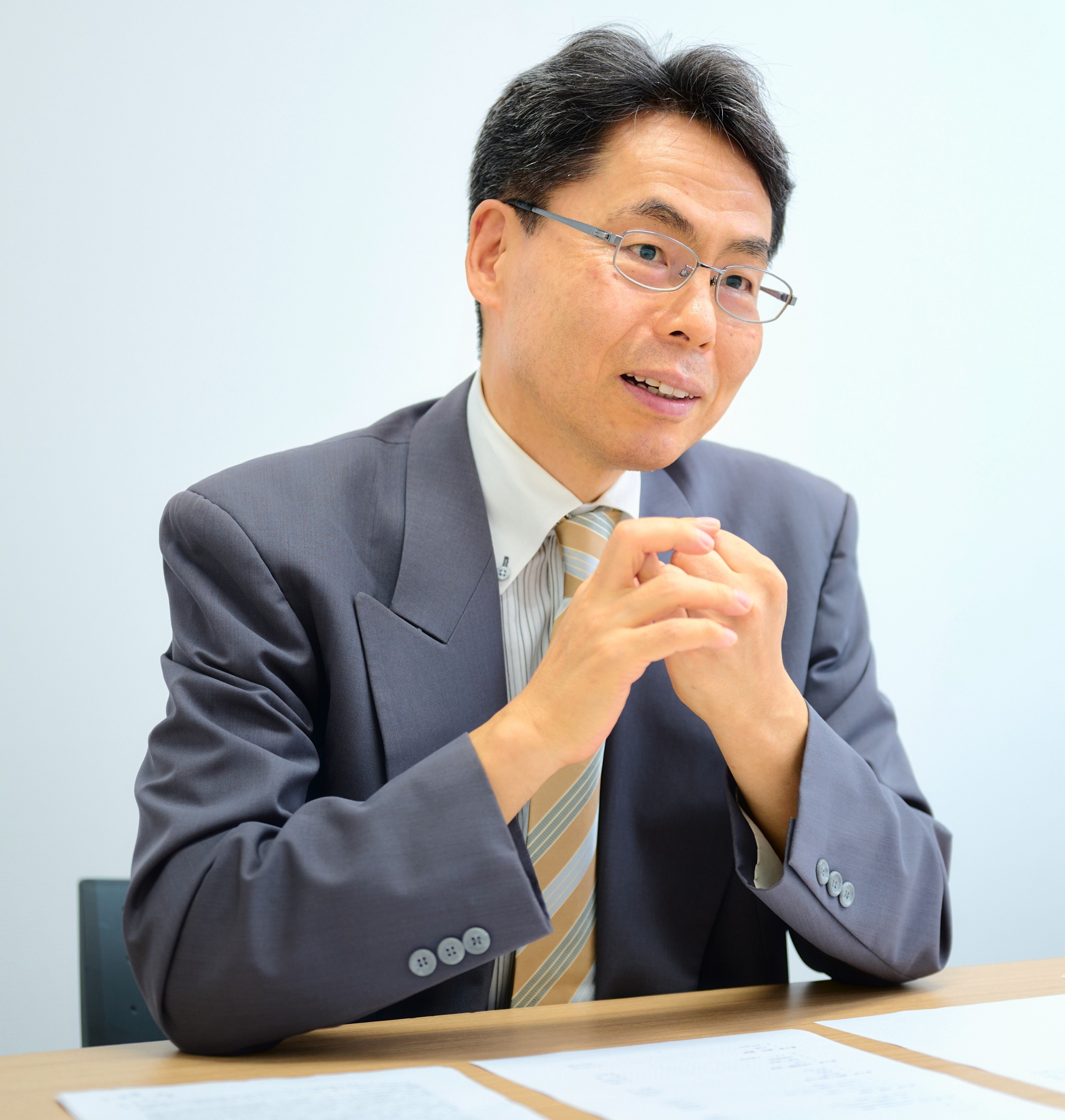
Yes. Unless people from various fields are involved, things will go unnoticed or overlooked. I myself specialize in administrative legal systems, but I sometimes feel that my way of thinking is different from that of people in civil law. For example, when Person A and Person B enter into a contract, from the perspective of civil law, you think about how to make it work, assuming that a contract is being made, but in the case of administrative law, you think about it from the perspective of limiting the content and subject of the contract, such as not being able to enter into a contract that violates human rights.
By looking at cutting-edge technology from such diverse perspectives and positions, we can identify problems that may arise in the process of its dissemination to society and consider how to solve them as a whole. To this end, the Institute brings together researchers from a wide range of fields, including ethics, legal philosophy, administrative law, criminal law, civil law, and commercial law, from both inside and outside the University, and broadens its perspective by having institute members serve on various government councils and conducting joint research with industry.
──What about collaborations with overseas academic institutions and researchers?
We are also working to expand our international research network. Just recently, our institute hosted a mini symposium entitled “Contemporary Issues of Insurance Agencies – A Comparison of Japan and Germany” in collaboration with the Waseda University School of Law and the Institute of Comparative Law, inviting a professor of the School of Law from the Free University of Berlin in Germany. This year (2024), the issue of fraudulent insurance claims by a major used car dealership became a hot topic in Japan, but in fact the issues surrounding insurance agents are a global issue. With a view to using advanced technology to solve this issue, we planned to compare and examine Japanese and German regulations regarding the insurance industry.
Advanced technologies such as AI, the metaverse, remote medical care, and autonomous driving are creating global challenges, so we are actively exchanging information and opinions with researchers from countries and regions such as the United States, the United Kingdom, France, Germany, China, and Taiwan. China and Taiwan in particular are important in terms of the economy and logistics, and last year (2023) we held a Japan-China symposium on public law and private law, as well as a Japan-Taiwan symposium on carbon neutrality and building regulations.
◆ Returning research findings to the educational field and considering a desirable vision for the future of society
–If an ethical approach is to be the foundation, it seems that education to cultivate that perspective and sensibility would also be necessary.
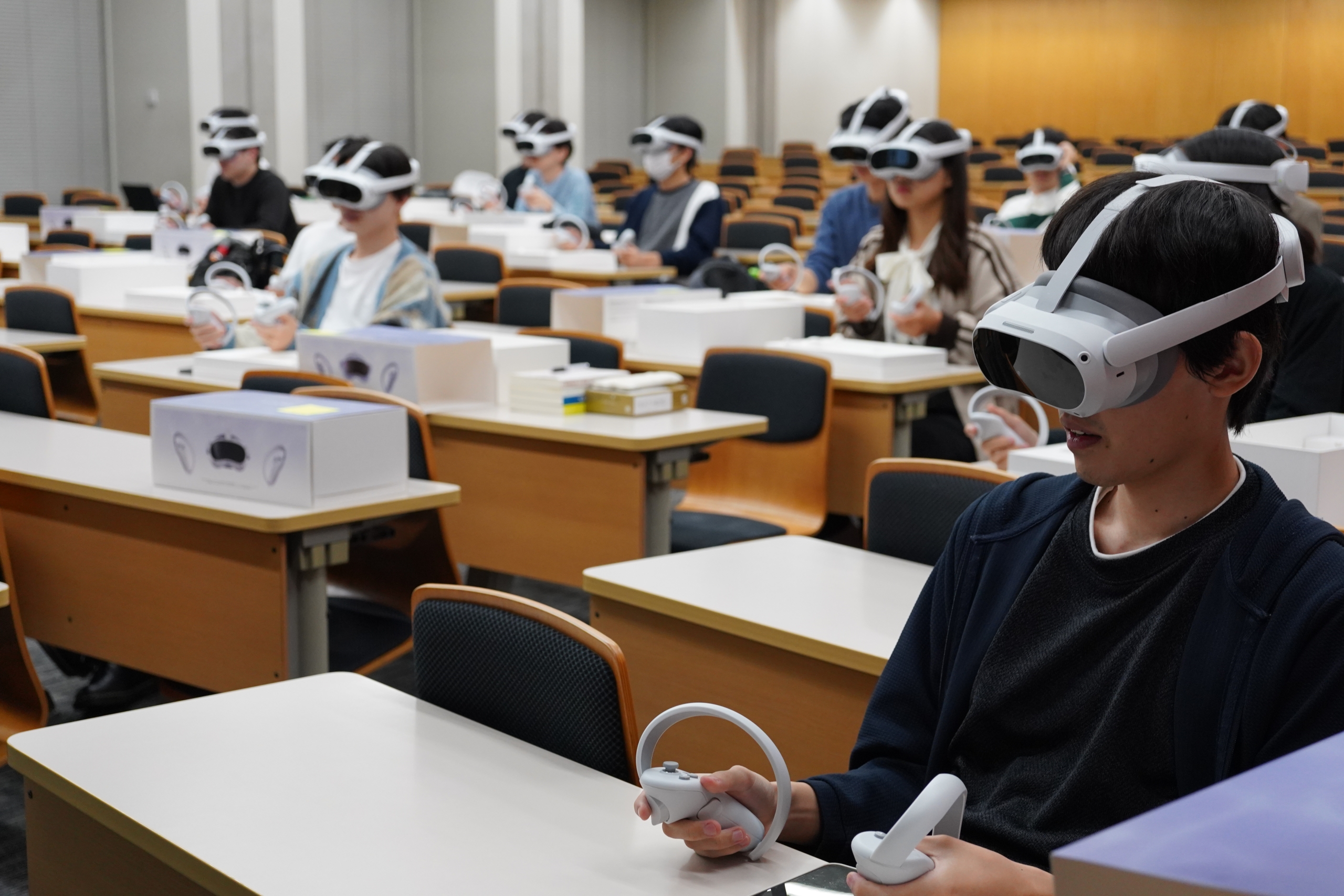
A class scene from the 2024 Aioi Nissay Dowa Insurance Co., Ltd. sponsored course “Metaverse and Law”
To that end, the Institute regards research and education as two wheels of its activities, feeding back the results and knowledge gained through research to students in the classroom, and feeding back questions and suggestions from students to research. Specifically, the Faculty of Law began a course called “Advanced Science and Technology and Law” in 2022, offering multiple subjects related to ethics, public law, and private law. The aim is to nurture talent who understand the impact of the development of science and technology on humans and the environment, and who can consider the ideal coexistence of humans and the natural world from an ethical perspective.

Provided by VLEAP Inc.
Last year, this course also began efforts toward education that integrates the humanities and sciences. Simply put, this means collaboration with researchers, students, and research institutions in the science and engineering fields, but in reality, there are difficult challenges, and we are still in the stage of exploring the possibilities. To understand the technical aspects of AI and the metaverse, you need to understand algorithms, and to learn how remote medical care works, you need technical knowledge about images and networks. How can we reflect what even on-site engineers and doctors are currently learning in education for humanities students? This is also one of our research themes.
So, going back to what I briefly mentioned at the beginning, it is important to work backwards from the ideal society and values we want to achieve and consider the ideal form of science, technology, and innovation as a means to achieve it. This is called RRI (Responsible Research Innovation), and together with ELSI (Ethical, Legal and Social Issues), that is, the approach of considering ethical, legal and social issues starting from science and technology, it is an essential way of thinking for policy making and technological development regarding future cutting-edge technologies.
──Speaking of education, I’ve heard that you have plans to publish textbooks.
We are currently working on a book titled “Metaverse and Law” (tentative title), co-edited by Sustainable Technology and Law Institute and Aioi Nissay Dowa Insurance Co., Ltd., with the goal of publishing it in the first half of next year (2025). This is part of the activities of a research group of the same name established within this institute, and we hope to make it a basic book that covers topics such as technology, ideas, and rights from an ethical perspective, so that it can be used as a textbook or read by the general public. We also have plans to publish a book based on the content of the “Advanced Science and Technology and Law” course mentioned earlier, and we intend to cover the “basics” with the same approach.
We are also collaborating with industry in research and education on “Metaverse and Law,” and last year, with the cooperation of VLEAP Inc., a Waseda-based startup that specializes in the metaverse, we opened a course donated by Aioi Nissay Dowa Insurance Co., Ltd. The textbook will take into account the results of such activities.
◆Towards a kind and sustainable society
──Please tell us about your future research themes and plans for your activities.
The most recent research we are considering is the development of technologies for decarbonizing energy as a way to address the issue of climate change. For example, one such technology is Carbon dioxide Capture and Storage (CCS), which separates and captures only CO2 from exhaust gases emitted by thermal power plants and transports it deep underground for storage. In preparation for next year, we have also begun a project in collaboration with researchers from the University of Bonn in Germany to study “energy transition policies and legal regulations using advanced technologies.”
Another thing I’m interested in is looking at science and technology from the perspective of “equality” and “equal opportunity.” It’s easy to overlook this, but it’s also important to use cutting-edge technologies such as the metaverse as a tool to support people who are restricted in their social activities for some reason, such as a disability. I’d like to keep my eyes open to see how science and technology can be used to create an equally kind society for everyone.
The goal of our research is to realize a “sustainable society” in which people and nature can coexist.
